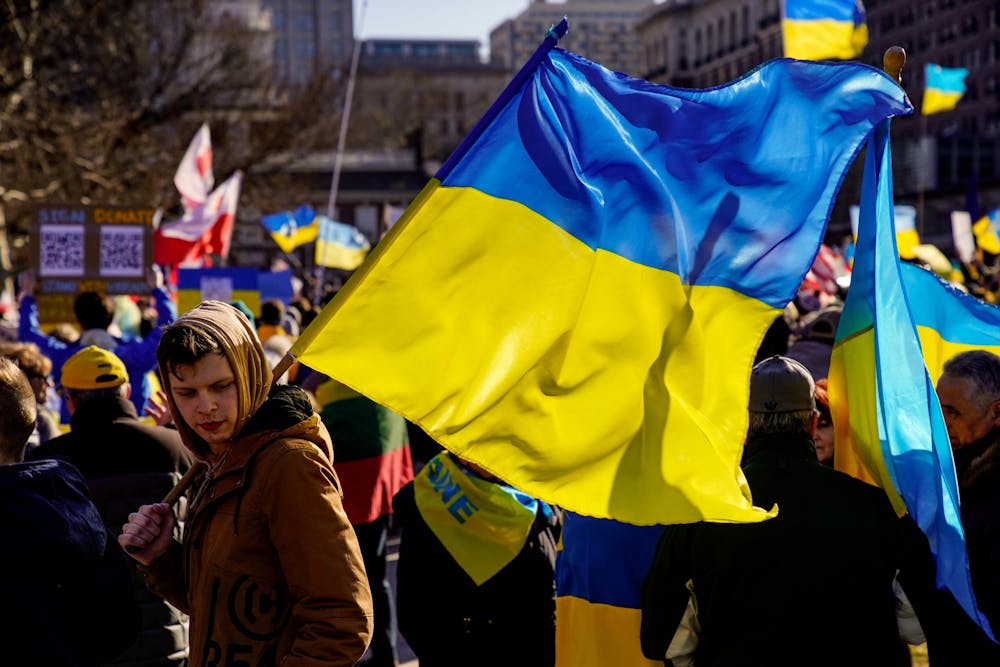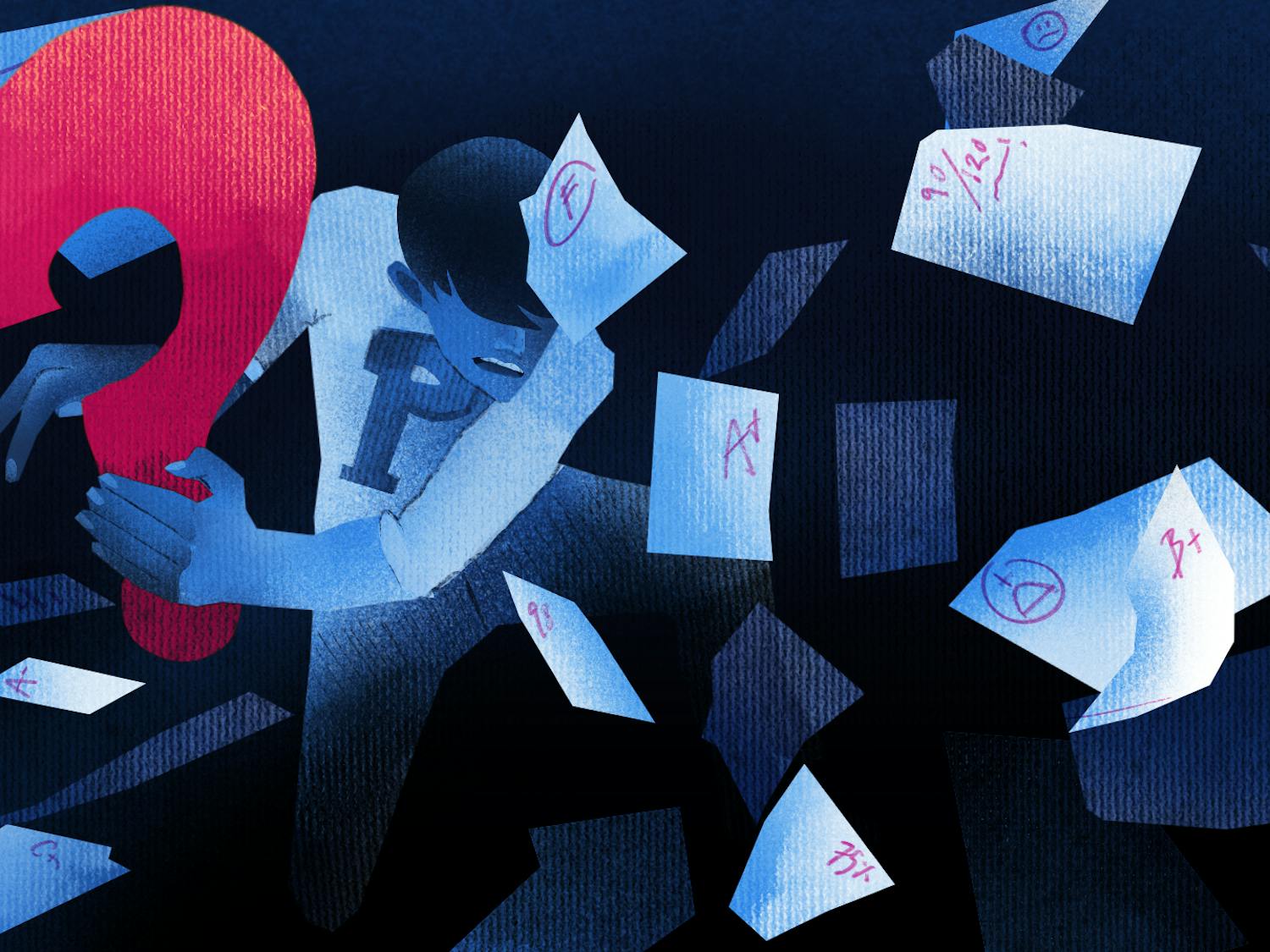Two weeks ago, Ukrainian Parliamentary member Oleksiy Goncharenko took my call from a train in Donbas, apologetic over a shoddy phone line. The ride was anything but peaceful. That morning, just ten kilometers from the frontline, he had been preparing for Russia’s new offensive — wave after wave of soldiers like in the First World War. His troops were hopeful, but Goncharenko was reminded that the odds were stacked against them.
Exactly a year after Russia’s unlawful invasion of Ukraine, it is important for the Penn community to remember why we must do everything we can to help them.
Lawmaker Goncharenko says this is a war of values — of democracy, the rule of law, and human rights — which form the basis of the free world. “If they can be violated in Ukraine, they can be violated anywhere.”
We’ve all seen the images that have come out of Ukraine over the past year. Anguished parents clutching the bodies of their children, killed by Russian shelling. Cratered buildings, entire walls sheared away to reveal intimate portraits of a lost peace. Doctors in blood-spattered surgical gowns, stress etched deep into their expressions as they labor to save as many as possible.
These pictures shock us, as they should. They are pictures of atrocities, each one encapsulating humanity at its breaking point. Ukrainians are a stoic, tenacious people. Their history, past and present, has ensured this. But no amount of inner strength and grit can compensate for the mind-numbing violence inflicted upon them. There are harms that cannot be undone and wounds that will never heal.
We owe it to Ukraine to take a stand against the unforgivable path Russia has taken. We have a responsibility, as citizens of the United States, to fulfill the promises we made to Ukraine in 1994, when they gave up their nuclear arsenal in exchange for security assurances. So far, we have not yet fulfilled these promises.
We have a responsibility, as inhabitants of a global world, to stand against the genocide, torture, rape, and destruction Russia is mercilessly inflicting on Ukraine, and ensure that such horrors are not visited upon Ukraine’s neighbors and the tens of millions of citizens residing therein.
There is no reason to believe that Putin will be satisfied by winning this war. He never has been before. Look no further than Georgia, attacked by Russia in 2008, or Crimea, annexed in 2014. The relative ease of these conquests has only bolstered Putin’s misguided ambitions to restore the Soviet sphere of influence in Europe and beyond. Ukraine could very well become the launching ground for Russia’s next bloody war of conquest.
For now, that future is still only a possibility, and while Ukraine is holding their own, they need help. As the war has dragged on, we have become increasingly numb to their plight, scrolling through the pictures that once shocked us without batting an eye. Absent the blockbuster city battles of earlier months, the headlines no longer grab our attention. However, the reality has not changed. This war will not simply disappear.
The Russian threat to Ukraine remains constant. To replace their decimated troops, Russia has pardoned criminals and drafted hundreds of thousands of young men. Their artillery mercilessly pounds civilian infrastructure and their forces mass on the outskirts of cities. In sheer numbers alone, they may overwhelm the Ukrainian forces.
Ukraine’s advantage lies in its access to high quality weaponry and in the solidarity of the West, and these circumstances must be maintained or the war may be lost. Some say we have done enough, but the circumstances show this cannot be true. The US needs to lead the way and set an example by sending more weapons and pushing for greater sanctions and increased international pressure. So long as Putin continues to drag Russia along on this mad path of destruction, our work is not done.

A child's backpack with a Ukrainian flag ribbon attached to it.
Every contribution, no matter how small, helps. The summer before starting my first semester at Penn Law, I quit my job to lend a hand. I flew to Prague, from where my parents had fled Russian oppression themselves under communist rule. I volunteered to teach Ukrainian children who had fled their war-torn home. They left behind fathers, brothers, grandfathers, uncles, and, sometimes, mothers who had stayed behind to fight. Their subsequent trauma led even the sound of helicopters to trigger tears. In spite of this and in spite of their precarious circumstances in the Czech Republic — living in crowded cloisters and learning in makeshift classrooms — every day was filled with their laughter and smiles. They taught me the Ukrainian national anthem. I taught them Barney’s “I Love You.”
You may wonder, rightfully so, what you, as individuals, can do to make a difference. The answer is simply to do what you can and do it as well as you can. Call your representatives and senators and express your support for Ukraine, requesting they take action. Donate to the cause, raise awareness in your community, or volunteer your time.
The Ukrainian children I taught are in dire need of $25,000 to keep their classroom going through the spring of 2023. Through GoFundme, I have been able to raise over $13,000 in donations for full-time teachers, supplies, and psychological care. Now at Penn’s law school, fellow classmate Julia Jarrett and I have co-founded the student group, Slavic+, which, in addition to raising visibility about Russia’s unlawful military action in Ukraine, has set out to raise the remaining $12,000 to support these Ukrainian refugee students.
If you aren’t sure where to start, this can be your way to make a difference. The longer we wait, the greater the devastation will be. We can no longer turn away and refuse to look.
The first-hand point of view and accounts in this column are courtesy of Kristina Kotyza, and Rachel Kabat contributed history and current events background.
KRISTINA KOTYZA is Penn Law’s Slavic+ Club Co-Founder and a Penn Law first year from Rye, New York. Her email is kkotyza@penncareylaw.upenn.edu.
RACHEL KABAT is a member of Penn Law’s Slavic+ Club and a Penn Law first year from Atlanta, Georgia. Her email is rkabat@penncareylaw.upenn.edu.









